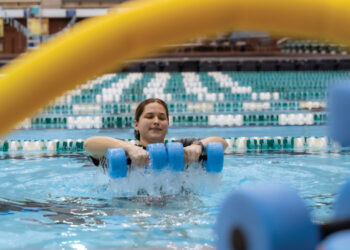How does a person define themselves? Whether it’s race, culture, religion or body image, everyone has a unique self-identity that is defined in many diverse ways. Oftentimes, this self-identity is nurtured and blossoms during their time in post-secondary education.
Campus recreation is so much more than just a gym. It’s a place where students can escape — a place where they can take their minds away from the stresses of school and the pressures of figuring out where they belong in this world to instead just be in the moment. College is a time where young people become adults, and most importantly, learn how to become independent. This is why inclusivity on campus is not only important but vital to ensuring the education system is developing as many young minds as it possibly can.
The Role of Campus Rec in Inclusivity
Although the Americans with Disabilities Act (ADA) was implemented 32 years ago, and civil rights for people with disabilities has made marked improvements, many students have felt accessibility on campus was a mere afterthought. Without any real enforcement of these laws — and considering the fact they don’t cover general items that would make people with disabilities feel more included like requiring truly adaptive equipment — it’s left up to campus recreation facilities to go above and beyond to truly serve all students. That’s why it’s refreshing to see the universities doing just that.
Schools like Michigan State University (MSU) are paving the way and setting examples for other schools to follow. It has its own Adaptive Sports Club in addition to many other efforts to make campus inclusive.
“From the first day I visited campus I was able to navigate it on my own, and I saw how accessible MSU is. I saw the opportunity here to thrive, to get a great education and to be independent,” said Piotr Pasik of MSU.
Being Part of the Inclusivity Solution
Adaptive sports and programming have many benefits:
- Improve the lives of students with disabilities.
- Helps them foster a sense of independence.
- Gives them a sense of community.
- Shapes their collegiate experience in a positive way.
So with 26% of adults in America living with disabilities, it’s an effort worth investing time and energy into. In addition, a staff well-trained in customer service and assisting people with disabilities ensures students feel welcome in recreation areas. It can be intimidating entering a campus rec facility for the first time not knowing what to expect. So, having a friendly helpful staff that knows how to operate adaptive equipment goes a long way.
Ultimately, schools have a choice: Be part of the solution or part of the problem.
By Aqua Creek Products. For more information, visit aquacreekproducts.com.










